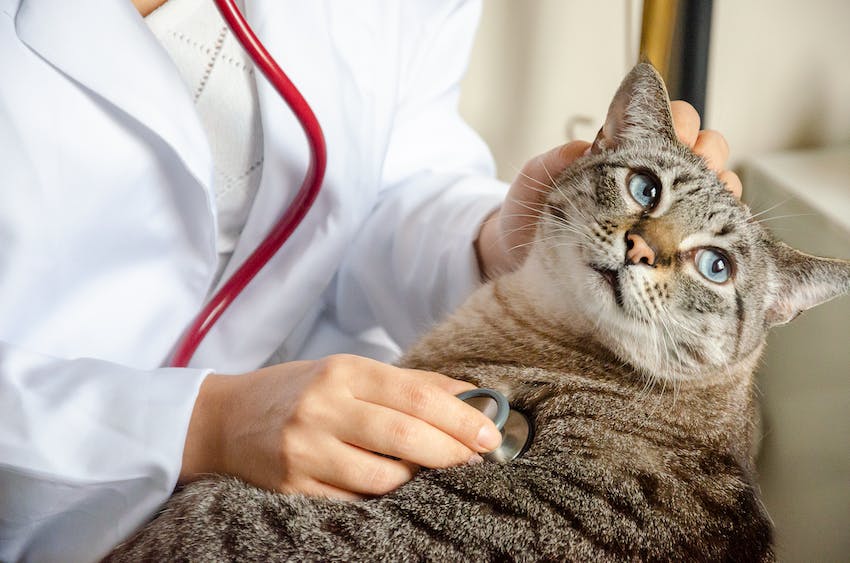Ready to help treat your pet to a healthy life?
A Guide to Pet Homeopathy
By : Nikki Edwards | Updated Apr 25, 2024

In recent years, pet owners have increasingly sought alternative and holistic approaches to pet healthcare. One such approach is pet homeopathy, a form of alternative medicine. Rooted in the principles of holistic healing, homeopathy for dogs and cats offers a gentle and natural way to support the health and well-being of our furry companions.
Nevertheless, veterinary homeopathy tends to vary widely between practitioners. While this form of care is generally considered safe, it’s important to understand the basics of homeopathy and what it can and cannot do. Always consult with a licensed veterinarian before beginning any treatments, and consider homeopathy as a supplement rather than a substitute for conventional veterinary medicine.
Principles of pet homeopathy
Pet homeopathy applies the principles of classical homeopathy to animals. Just as in human homeopathy, it aims to stimulate the body's natural healing mechanisms and restore balance on a physical, mental, and emotional level. Homeopathic remedies for pets are typically derived from natural sources such as plants, minerals, and even certain animal substances.
One of the key principles of pet homeopathy is individualization. Each pet is viewed as a unique being with its own set of physical and emotional characteristics. When prescribing solutions. homeopathic veterinarians will take into account not only the pet's physical symptoms, but also its temperament, behavior, and environment.
Does homeopathy work?
Currently, there is little scientific research on homeopathy and its efficacy on pets. One of the few veterinary publications on the topic — a systematic review of pet homeopathy published in 2015 — provided an “inconclusive” stance, citing the data as too varied to be reliable. A 2023 article from the Royal Veterinary College in the UK likewise stated that homeopathy was ineffective but also acknowledged clinical trials as “the subject of numerous biases.”
As the American Veterinary Medical Association acknowledges, many veterinarians support homeopathy as a safe alternative treatment though more research is needed to determine its impact. As a pet owner, the choice to pursue homeopathy is therefore up to you and your veterinarian. Many practitioners and pet parents alike believe homeopathic treatments to be effective in helping to ease a pet’s pain and stress levels, especially when used in conjunction with conventional medicine.

5 potential benefits of homeopathy for pets
Homeopathic medicine for pets offers several potential benefits for our dogs and cats.
1. Gentle and non-invasive
Homeopathic remedies are highly diluted and gentle, making them suitable for pets of all ages, including puppies, kittens, and senior animals. They have minimal to no side effects when prescribed correctly by a qualified vet practitioner.
2. Holistic approach
Rather than just targeting specific symptoms, homeopathy is intended to address the underlying imbalances that contribute to illness. This is believed to lead to long-lasting improvements in overall health and well-being.
3. Complementary to conventional care
Pet homeopathy can be used alongside conventional veterinary treatments to enhance their effectiveness and minimize side effects. It's important to work with a veterinarian who is knowledgeable in both conventional and holistic modalities to ensure integrated care for your pet.
4. Addresses behavioral issues
Homeopathy is believed to be effective in overcoming behavioral problems in pets, such as anxiety, aggression, and compulsive behaviors. By restoring emotional balance, homeopathic remedies can help improve the quality of life for both the pet and its owner.
5. Support for chronic conditions
Homeopathy is believed to provide valuable support for chronic conditions such as allergies, arthritis, and skin disorders. By stimulating the body's self-healing mechanisms, homeopathic remedies can help manage symptoms and improve quality of life.
What conditions can homeopathy treat?
Homeopathic veterinary care is used to address a wide range of acute and chronic conditions in pets. Common ailments treated with homeopathy include:
- Chronic skin issues — Homeopathy can be effective in treating skin conditions such as itching, hot spots, and allergic reactions.
- Digestive disorders — Remedies are available for pets suffering from vomiting, diarrhea, constipation, and other gastrointestinal issues.
- Joint pain and arthritis — Homeopathy offers relief for pets experiencing joint pain, stiffness, and mobility issues associated with arthritis.
- Behavioral problems — Homeopathic remedies can help alleviate anxiety, fear, aggression, and other behavioral issues in pets.
- Respiratory conditions — Homeopathy may provide relief for pets with coughing, sneezing, and respiratory infections.
If you're considering homeopathic therapy for your pet, always consult with your veterinarian prior to starting any treatment, regardless of whether your pet's condition is on the list above.

Common homeopathic remedies
Homeopathic treatments can vary widely between practitioners. That said, the most commonly used homeopathic remedies for animals include:
- Arnica — used for general pain relief and treating musculoskeletal injuries
- Euphrasia — commonly used to treat eye problems, such as conjunctivitis
- Sulphur — used to treat skin problems, particularly skin allergies
- Cocculus — used to treat motion-induced vomiting (car sickness)
- Silica — used to expel foreign bodies, such as thorns or seeds, from the skin, and can also be used to treat abscesses and sinusitis
- Borax — good for calming pets during thunderstorms and fireworks
- Rhus toxicodendrom — used to treat arthritis, red swollen eyes, and skin infections
- Cantharis — used to relieve the symptoms of cystitis, as well as treat skin conditions and scalds and burns
Consult a homeopathic veterinarian
Homeopathy for pets offers a gentle and natural approach to supporting the health and well-being of our beloved four-legged companions. By addressing the underlying causes of illness and restoring balance on physical, mental, and emotional levels, homeopathy can complement conventional veterinary care and provide valuable support for a wide range of conditions.
While some pet owners may self-administer homeopathic remedies to their pets, consulting a qualified homeopathic veterinarian is highly recommended. Homeopathic vets are trained to assess the pet's overall health and prescribe the most suitable remedy based on their individual needs. They also provide guidance on dosage, frequency, and monitoring of your pet's progress.
Homeopathic veterinarians may also integrate other holistic modalities such as acupuncture, herbal medicine, and nutritional therapy to enhance the pet's well-being. This holistic approach addresses not only the physical symptoms but also the underlying imbalances that contribute to the pet's health issues.
Homeopathic medicine for your pet
If you're considering homeopathy or any kind of alternative treatment for your pet, be sure to consult with a qualified veterinarian who is experienced in both conventional and holistic modalities. Homeopathy is not intended to replace traditional veterinary care nor should it be administered without guidance from your vet. With proper care and instruction, homeopathy may help your pet live a less stressful, healthier life.

Pet insurance that covers homeopathy
As pet insurance regulations vary by location, some Trupanion plans may already include homeopathy and alternative medicines (when administered by a licensed veterinarian). For plans that do not already have this additional coverage, you can choose a Recovery and Complementary Care Rider which covers a multitude of homeopathic treatments and procedures. In addition to homeopathic remedies, this coverage includes other alternative treatments like veterinary-recommended acupuncture, behavioral modification, chiropractic treatment, hydrotherapy, naturopathy, and rehabilitative therapy.
The use of these additional treatments in conjunction with more conventional medical practices can help nurse your feline or canine friend back to health while also keeping them comfortable while they heal. From effective pain relief to promoting healing and recovery, alternative therapies can help restore your pet’s health as rapidly, safely, and effectively as possible.
